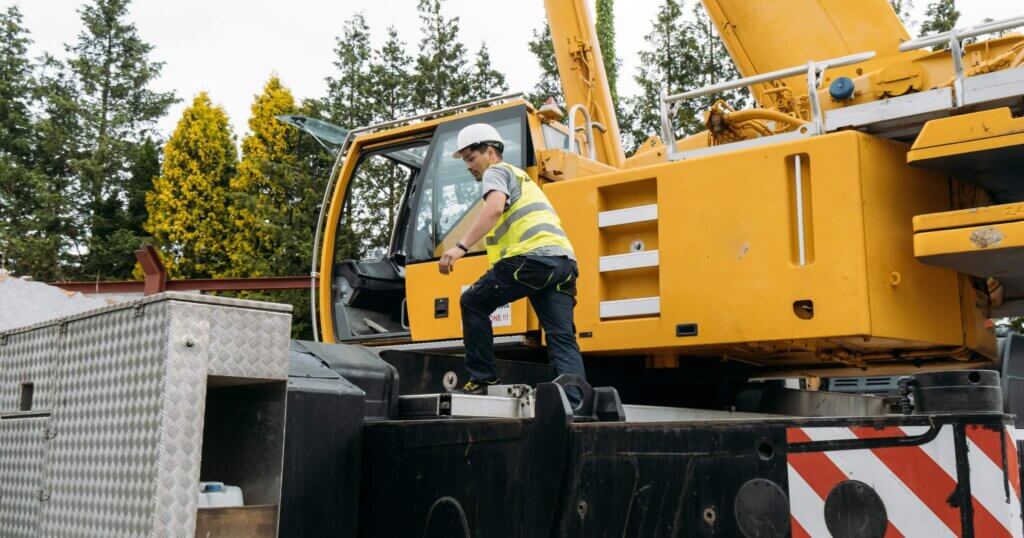If you aim to become a heavy equipment operator in the U.S., this guide provides clear steps and practical advice to help you start your career. Heavy equipment operators work on construction sites, in mining, and large scale infrastructure projects. They typically handle heavy machinery like bulldozers, excavators, and tower cranes. This profession offers solid pay, job stability, and opportunities for advancement. We’ll walk you through the requirements, training options, application process, and tips for success.
3 steps to become a heavy equipment operator in the U.S.
Step 1: Meet the basic requirements
To qualify as a heavy equipment operator, such as a crane operator, construction equipment operator, or forklift operator, you typically need to:
- Age: Be at least 18 years old.
- Education: You must have a high school education – either a high school diploma or a GED.
- Physical fitness: Be in good physical condition to handle demanding tasks.
- Driver’s license: Hold a valid driver’s license; a commercial driver’s license (CDL) may be required for certain equipment.
Requirements can vary slightly by state or employer, so checking local regulations is advisable.
Step 2: Research training programs in your area
Training is needed to learn how to safely and skillfully operate heavy machinery. There are several pathways to get the training you need, and it’s necessary to understand the options in your area so you can choose the one that best fits your goals and lifestyle.
Trade schools and vocational programs
Trade schools and vocational training centers offer structured programs that teach the basics of heavy equipment operation, safety procedures, machine maintenance, and site preparation. These programs often last several months to a year and are designed to prepare you for entry-level roles, like the forklift certification.
Many include hands-on training on various equipment, giving you valuable experience before you enter the workforce. These programs can be found at local technical colleges, specialized heavy equipment schools, or even through some construction companies that partner with education centers.
Apprenticeships
An apprenticeship is one of the most comprehensive training programs for becoming a heavy equipment operator. Programs like those offered by the International Union of Operating Engineers (IUOE) combine paid, on-the-job training with classroom instruction. Apprenticeships typically last three to four years, depending on the program, your state, and the large machines you are training on.
During an apprenticeship, you’ll complete field training, working alongside experienced operators, learning the ropes on real job sites while earning a wage. Apprenticeships are often offered through unions, employer-sponsored programs, or industry associations.
How to find an apprenticeship:
- Unions: Contact your local IUOE or similar trade unions. They often have apprenticeship coordinators who can guide you through your career path.
- School placement offices: Many technical schools have connections with local employers or unions and can help place graduates into apprenticeships.
- Direct with employers: Some construction companies offer their own programs or are willing to sponsor new workers into union apprenticeships
Benefits of apprenticeships include:
- Earning while you learn
- Gaining hands-on experience with different types of heavy equipment
- Building a strong foundation of technical knowledge and safety practices
- Faster career progression
Community colleges

Photo courtesy of Shutterstock.com
Many community colleges offer certificate or diploma programs in heavy equipment operation. These programs typically take less than a year to complete and cover equipment operation, site safety, and job site management fundamentals. Some also offer pathways to earn credits that can be applied to other construction-related degrees or training. Community college programs can be a cost-effective choice and may be eligible for federal financial aid.
Programs vary widely by state and region. Some areas have strong union presence and offer more apprenticeship slots, while others may rely more heavily on private training schools or employer-led programs. Researching local training options will help you find the best fit, save money, and start working faster.
Step 3: Apply to programs
Once you’ve identified the training programs or apprenticeships in your area, the next step is to apply. Application processes vary depending on the type of program, but there are some general steps you can follow to give yourself the best chance of success.
How to apply to training programs
For trade schools, vocational programs, and community colleges:
- Check admission requirements: Most programs require a high school diploma or GED. Some may require placement tests in math or reading.
- Prepare your documents: Gather your transcripts, proof of previous training, and identification documents. Some programs may also require a resume or letters of recommendation.
- Submit your application: Applications are often available online through the school’s website. Some programs have rolling admissions, while others have set deadlines, especially for high-demand courses.
- Explore financial aid options: Many schools accept federal financial aid, scholarships, or grants. Some even have partnerships with local employers who may help cover tuition costs in exchange for a work commitment.
How to apply for apprenticeships
- Contact the local union or apprenticeship coordinator: They will provide details on upcoming apprenticeship intakes, required documents, and testing schedules.
- Meet eligibility requirements: Requirements can include being at least 18 years old, having a valid driver’s license, passing a drug screening, and demonstrating basic math or mechanical aptitude.
- Complete any entrance assessments: Many apprenticeship programs require candidates to pass written exams, interviews, and physical evaluations.
- Attend orientation or information sessions: Some programs require or recommend attending a session where you can learn more about the expectations, schedule, and benefits of the apprenticeship.
7 tips for success as a heavy equipment operator in the U.S.

Photo courtesy of Shutterstock.com
- Prioritize safety: Always follow site-specific safety protocols, undergo regular safety training, and wear the required personal protective equipment (PPE) such as helmets, gloves, and reflective vests. Being proactive about safety protects you and keeps your coworkers and the job site secure.
- Stay updated: The construction industry is constantly evolving, with new machinery, technology, and methods emerging regularly. Staying informed about these advancements ensures you remain competitive in the job market and can operate the latest equipment efficiently.
- Maintain physical health: Operating heavy equipment can be physically demanding, requiring physical strength, endurance, and coordination. Regular exercise and a healthy lifestyle will help you meet these demands and ensure the safe operation of all equipment on the job. Stretching, strength training, and cardiovascular activities are particularly beneficial for maintaining overall fitness.
- Develop soft skills: While technical skills are essential, soft skills like communication, teamwork, and problem-solving are equally important on a construction site. You’ll often need to coordinate with other workers, supervisors, and contractors, making clear and respectful communication crucial. Being a good team player can also lead to better working relationships and more opportunities for advancement.
- Seek mentorship: Learning from experienced operators is one of the best ways to develop your skills and avoid common mistakes. A mentor can offer practical tips, share real-world experiences, and guide you through challenging tasks. Building these relationships can also open doors to job leads and professional networks.
- Be punctual and reliable: Construction projects run on tight schedules, and every team member plays a part in keeping operations on track. Being punctual, dependable, and consistent shows respect for your team and can enhance your reputation as a trusted professional. Employers often notice and reward the hard workers who can be counted on.
- Continue education: Even after you’ve completed your initial training, continuing education can help you advance your career and qualify for more specialized roles. Additional certifications, such as a front-end loader or a pile driver certificate, can make you more valuable to employers. Lifelong learning also shows initiative and dedication to your profession.
Why become a heavy equipment operator in the U.S.?
The demand for skilled heavy equipment operators is strong, driven by ongoing infrastructure projects and a shortage of qualified workers. This career offers:
- Job security: Consistent demand across various industries.
- Competitive pay: Attractive salaries with opportunities for overtime.
- Career advancement: Potential to move into supervisory or specialized roles.
- Union benefits: Access to training, health benefits, and retirement plans through unions like the IUOE.
How much do heavy equipment operators make?
Heavy equipment operators’ salaries in the U.S. are dependent on experience, certifications, region, and the type of equipment they handle. According to data from the U.S. Bureau of Labor Statistics (BLS), the average heavy equipment operator salary is around $55,000 annually, but entry-level operators may start closer to $38,000 annually. Those with several years of experience or specialized skills, such as crane operation or excavation in hazardous conditions, can earn over $80,000 annually, especially in high-demand areas like oil fields, large infrastructure projects, or union-backed jobs.
In addition to base pay, many operators have opportunities for overtime, shift premiums, and bonuses, especially when working on large-scale projects or in remote locations. Some operators increase their income by becoming certified to run multiple types of equipment, which makes them more versatile on a job site and attractive to employers.
The job outlook for heavy equipment operators is solid, with the BLS projecting about 3% growth through 2032, keeping pace with national averages for other construction jobs. Regions experiencing infrastructure growth, like Texas, Florida, and the Midwest, often have higher demand and better pay rates. Opportunities exist to advance into supervisory roles, safety management, or start a contracting business once you’ve gained enough experience.
Interested in more construction career insights? Subscribe to our newsletter at underthehardhat.org/join-us for the latest updates and resources.



2 comments